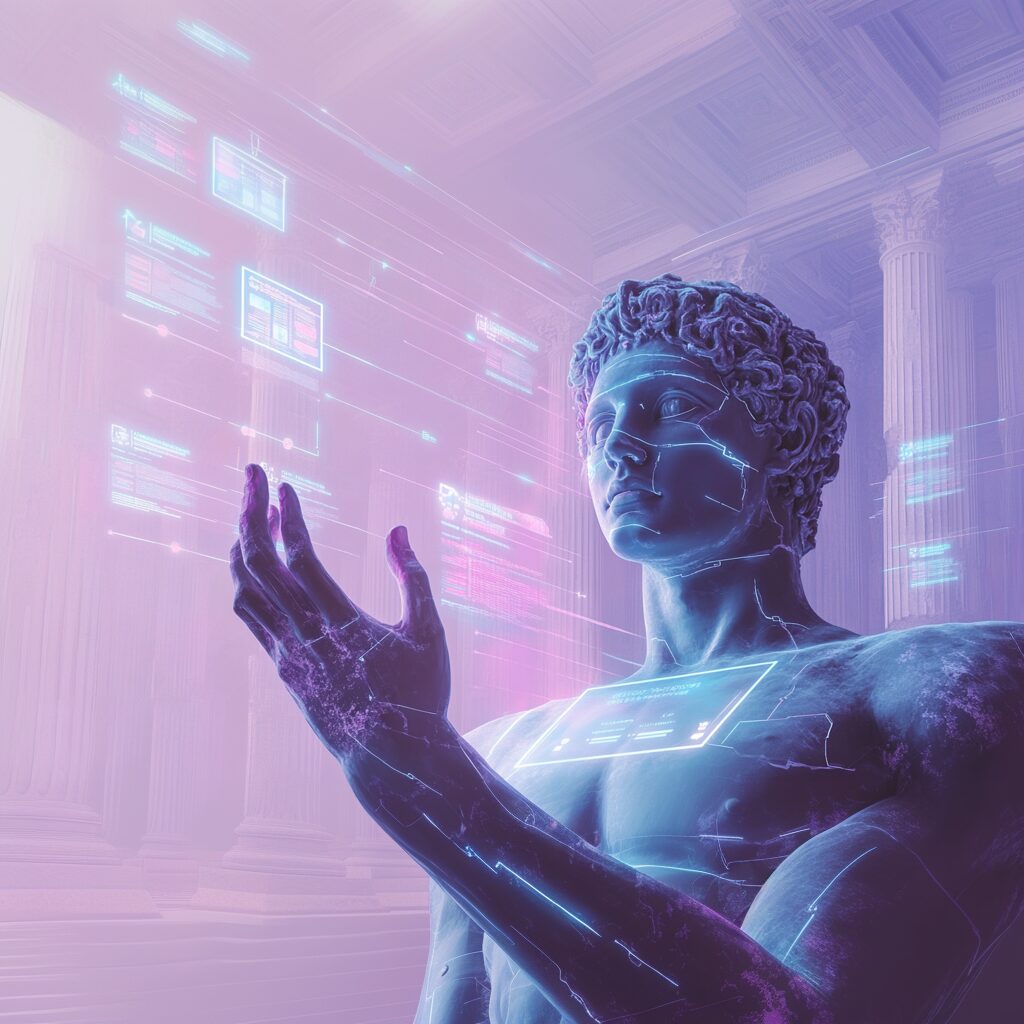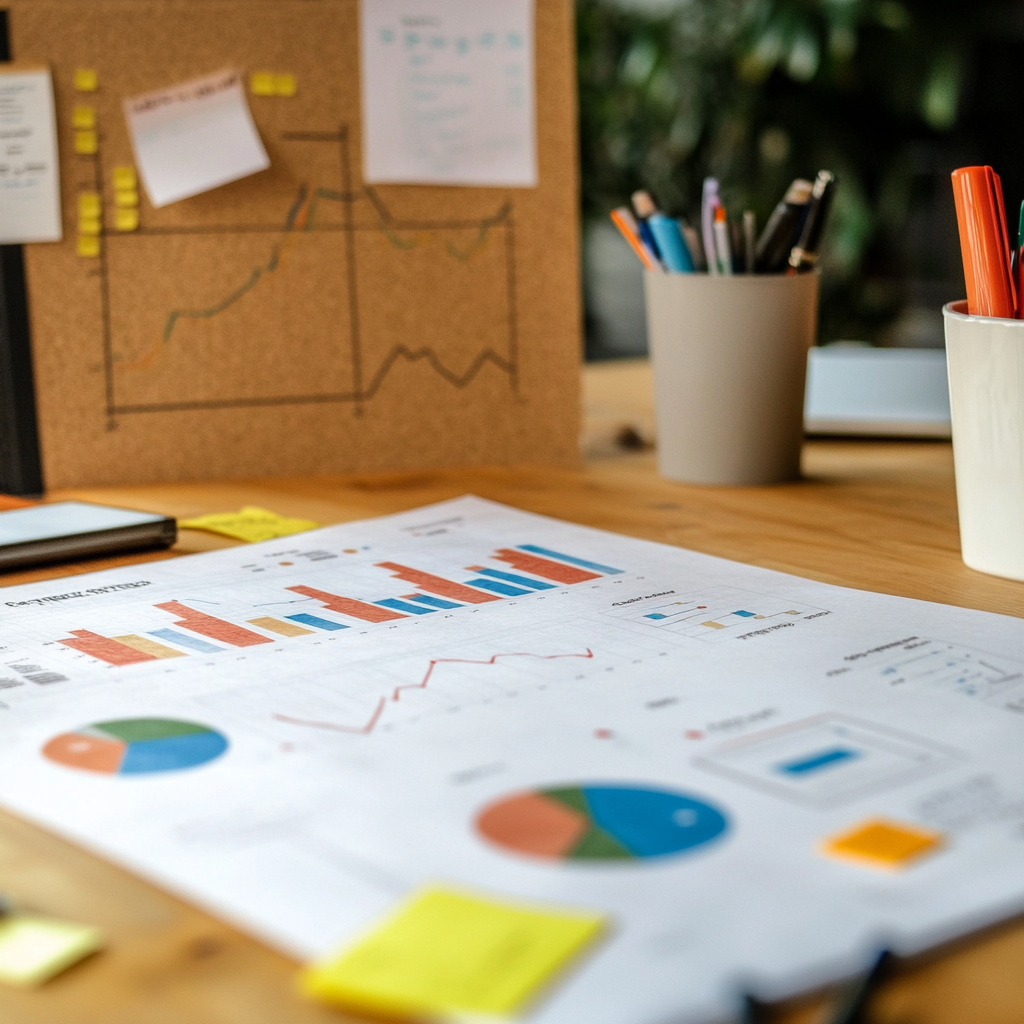Date of publication:
18 Dec. 24Ethics of artificial intelligence
Let’s simulate a situation: you wake up in the morning and your smart alarm clock decides not to ring because it knows you haven’t had enough sleep. In the kitchen, the coffee machine has already prepared the perfect espresso, taking into account your yesterday’s stress. And on your smartphone screen, algorithms offer you not only news but also business solutions, as if they understand your thoughts. Not to mention that adaptive learning allows you to create personalised programmes that deliver better learning outcomes thanks to artificial intelligence in education.

Does all this sound like science fiction? In fact, it is the present. Artificial intelligence is already here. But along with its conveniences, it brings with it a whole suitcase of ethical dilemmas. Can machines make moral decisions? Who controls their actions? And most importantly, are we ready to live in a world where algorithms know more about us than we do?
One of the most high-profile cases was an automated credit risk assessment system in the United States. It turned out that it refused certain groups of people based on their ethnicity. Who was to blame? The algorithm or those who created it?
We are on the threshold of a new era where ethics is no longer just a human concept. In this article, we will not only explore the challenges faced by artificial intelligence, but also try to find answers to the questions that concern each of us: how to remain human in the world of machines?
Ethical challenges of artificial intelligence
Artificial intelligence is like a guest who was invited to a party but forgot to tell the rules of the game. It is fast, powerful, and very useful, but sometimes it can do harm without even realising it. The main ethical challenges facing AI can be divided into three categories: privacy, bias, and responsibility.
Privacy: data is the new oil
AI is data-driven. Your search queries, geolocation, purchases — all of this is fuel for its work. But what if this data falls into the wrong hands? For example, companies can use AI to predict and manipulate your behaviour. For example, the scandal with Facebook and Cambridge Analytica, when algorithms were used to influence elections.
Bias: the algorithm knows but does not understand
AI has no moral convictions, but it learns from the data it is given. If this data contains biases, the algorithm simply repeats them. In 2018, Amazon was forced to abandon its hiring system that discriminated against women. Why: The algorithm “learnt” that men were more likely to get high positions and automatically rated female candidates lower.
Liability: who is to blame
Imagine a situation where an autonomous car causes an accident. Who is responsible for this? The programmer who wrote the code, the car manufacturer, or the car owner? This question is becoming more and more acute as AI develops and such situations become more frequent.
In fact, the use of AI faces some ethical challenges:
- Privacy and data protection issues.
- Biases in algorithms.
- The issue of liability for AI actions.

Responsibility in the use of AI: who is responsible for what
Today, artificial intelligence is like a super-cool employee who can do almost anything, but its actions often remain beyond control. Who should be in control when AI takes over? There are three key players: developers, business, and government. And all of them, like a good team, should share responsibility.
Developers: geniuses, but not magicians
Programmers are those who create the algorithms that control artificial intelligence. But their work is similar to putting together a jigsaw puzzle: if the pieces don’t fit, the picture won’t come together. Often, ethical issues are simply not in focus during development.
Imagine building a house without an architect, relying only on off-the-shelf materials. It might stand, but will it be comfortable to live in? It is the same with AI. For example, Microsoft created Tay, a chatbot that turned into a toxic troll in a day. The reason: lack of filters and testing.
Business: who pays the piper calls the tune
For companies, AI is not just a technology, but a source of profit. Algorithms are already doing all of these things: predicting demand, optimising costs, even analysing customer emotions. But is it always ethical?
Governments: Sheriffs of the Digital Wild West
AI today is like an untamed element, and without clear rules, it becomes dangerous to play. Governments are trying to establish control through laws. For example, the EU is implementing the AI Act, which imposes restrictions on developers and companies. And China is already testing an ethical rating for technologies.
But the question is… Who is responsible?
Developers: build algorithms and are responsible for their ethics.
Business: uses AI for profit, but should take care of transparency.
Government: creates laws that protect people’s rights.
Responsibility is like a jigsaw puzzle: every piece is important. Without one of the players, the system can collapse.

Positive examples of artificial intelligence use
Artificial intelligence can be more than just a cold technology. It can become a real hero of our time if its potential is properly harnessed. What does it look like in practice? Let’s talk about real-life examples.
Medicine: AI that saves lives, not just money
One of the biggest AI breakthroughs is in the medical field. Artificial intelligence is already helping doctors find diseases where the human eye can miss them. For example, Google’s DeepMind system detected breast cancer more accurately than leading specialists.
A real-life example: in 2020, AI helped analyse millions of medical images in a week, which would otherwise have taken months. This saved thousands of lives.
And this is just the beginning. Algorithms are already being used to predict epidemics, helping to stop them before they break out.
Ecology: AI as a conservationist
AI doesn’t just process data, it can be a game changer. Imagine a system that monitors deforestation in real time and automatically notifies local authorities. This is exactly how algorithms work in Brazil, helping to fight illegal deforestation in the Amazonian jungle.
Education: A Tutor Who Never Gets Tired
Schools and universities are important, but they don’t always adapt to the individual needs of students. But AI can. Platforms such as Coursera use algorithms to create personalised courses that adapt to each student’s learning pace.
Case in point: in one of the schools in Finland, AI helped to increase academic performance by 25% thanks to an individual approach.
The key is the right approach
AI is like a sharp knife: skilful hands can turn it into a culinary masterpiece, while inept hands can create problems. Positive cases show that artificial intelligence can be not only useful but also vital.

What’s next? Recommendations for business and society
Artificial intelligence is no longer a fantasy, but a tool we use every day. But in search of opportunities, it is important not to forget the main thing: the responsibility for its use lies with us. So, what can we do today to prevent AI from causing another crisis tomorrow?
For business: use AI wisely
Businesses should look at AI as a partner, not a magic wand. To benefit, you need to invest not only in technology but also in the right approach.
One of the key points is team training. You can have the best algorithm, but if employees don’t know how to work with it, the result will be like the old joke: “What doesn’t lie well, they automated.”
For society: turn fear into a tool
Many people perceive AI as a threat. “It will take our jobs!”, “It knows everything about us!” Sound familiar? But in reality, AI is not an enemy but an assistant. The key is to understand its limits.
A real-life example: Germany has created an initiative where communities teach residents how to use AI in everyday life, from financial management to travel planning.
Each of us can be part of the change: support initiatives, share your ideas and demand transparency from companies and governments.
Checklist: how to start changing the future today
AI is just a tool, not a universal hero or villain. It all depends on how we use it. And if we use it wisely, AI will be the key to a better future. Here are some tips on how to use artificial intelligence effectively:
- Introduce rules for the ethical use of AI in your company.
- Train your employees or colleagues to understand technology.
- Join public discussions on AI implementation.

Conclusions: How to remain human in a world of machines
Artificial intelligence is like a superpower that we have all been given, but have not yet learnt how to use properly. It opens up incredible opportunities for us, but it also raises the question: how do we remain human when technology becomes smarter than us?
The main idea: AI is neither good nor evil. It is a tool that reflects our intentions. And if we want it to help rather than harm us, we need to learn to cooperate with it.
- Businesses can gain a competitive advantage by implementing ethical principles in the use of AI.
- Society must learn to understand AI and not be afraid of it.
- Governments are obliged to establish rules that protect the rights of everyone.
Responsibility starts with us
Waiting for change from above is like standing under a tree and waiting for apples when you already have a seedling in your hand. Set your own standards, train your team, and implement transparency. Artificial intelligence is a partner, not a threat.
How about starting small? Explore how AI can help your company or improve your life. Stay open to new knowledge.



